Engagement Feature Articles
KOA - Global Components Manufacturer situated in Nagano Prefecture's Ina Valley
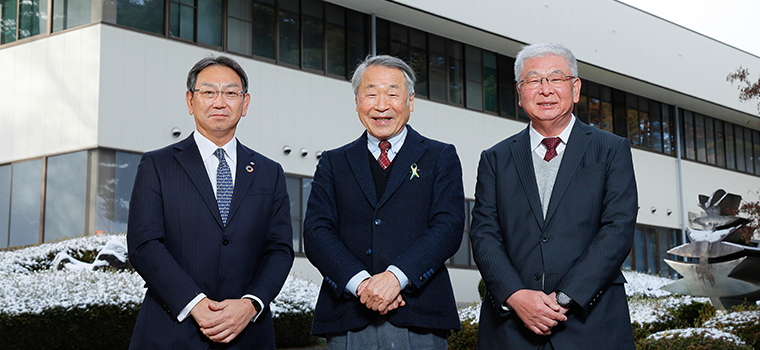
Right: Tadao Hanagata, Representative Director and President of KOA Corporation
Left: Hiroyasu Koike, President and CEO of Nomura Asset Management Co., Ltd.
Headquartered in the town of Minowa in southern Nagano Prefecture and surrounded by the Central and Southern Japanese Alps, KOA is one of the world's leading manufacturers of resistors essential for electrical and electronic circuits. The company is particularly adept at manufacturing resistors for automobiles, which require strict quality standards, and is expected enjoy further growth with the spread of electric vehicles (EVs). Against the backdrop of the snow-covered Ina Valley, Mr. Koichi Mukaiyama and Mr. Tadao Hanagata of KOA Corporation joined Mr. Hiroyasu Koike of Nomura Asset Management to discuss the social values that the company has cherished since its establishment in 1940.
Hometown Invigoration through New Industry
Koike This morning, when I toured the factory I was impressed with the cleanliness of the interior and the friendliness with which the employees greeted me. Furthermore, I was moved by the idea that you are making cutting-edge components while surrounded by this natural beauty.
KOA is well known as a global manufacturer of resistors. Its founding vision is based on "unity between farming and manufacturing" and "bringing sunshine to the Ina Valley", while valuing 5 core entities of shareholders, customers and business partners, employees and their families, local communities, and the earth (environment). This idea has been handed down and implemented since a time where the word "stakeholder" did not exist. Could you tell me more about the background behind the company's founding and its founding vision?
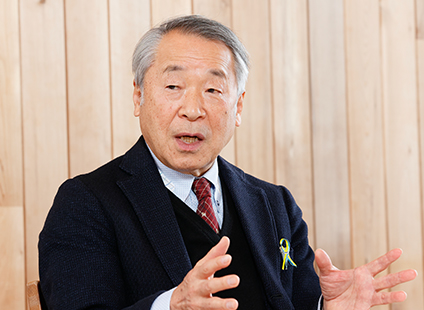
Mukaiyama I think there are two main elements. One is the historical background. The founder, Kazuto Mukaiyama, was born in 1914. He was born as the second son among eight brothers to a family of silk farmers at a time when the silk reeling industry was flourishing in Nagano, primarily around the town of Okaya. However, the silk reeling industry, which had supported post-Meiji Restoration modernization, was hit hard by the Great Depression in 1929 (Japan's Showa Depression). The price of silk cocoons plummeted, and the silk-focused economy of the Ina Valley was decimated. This put a particular strain on livelihoods of rural families.
The other main influencing factor was the founder's outlook on life. When only in his late teens, Kazuto Mukaiyama felt a need to reinvigorate his hometown through new industry. He traveled to Tokyo where he attended night school while working at a charcoal store. Upon gaining admission to Waseda High School of Engineering, he made the acquaintance of a teacher researching cathode-ray tubes. Later, he would say that was "God's will". Seeing that the world was entering the age of electricity, the founder was convinced that electrical components would be a suitable fit for the dexterous people of his hometown and that the industry would take root in the natural beauty of the Ina Valley.
KOA has two founding visions: "unity between farming and agriculture" and "bringing sunshine to the Ina Valley".
Agriculture is of the utmost importance, but it is not enough to make a living. "Unity between farming and agriculture" represents invigorating the region with the electrical component industry, creating jobs, conserving the fields, forests, culture, and lifestyles of the area, and energizing local communities. Meanwhile, "bringing sunshine to the Ina Valley" represents the electrical component industry taking the place of the former silk industry and creating a new societal foundation. Even as generations change, "let us cherish our hometown". This is the origin of KOA and its founding spirit.
Koike So, this means developing your business to cultivate and contribute to the region prior to business ideas and management. I feel it strongly captures the social aspect of ESG.
I have the opportunity to meet many executives, and I am deeply impressed by your firm's strong awareness of contributing to the community.
Building Trust with Set Manufacturers through Dedication to Components
Koike In the past decade, your company's business has doubled in scale. Particularly, during the last two to three years operating profit has more than quadrupled.
While market factors have been positive for passive components in general, I would like to hear about your business's strengths.
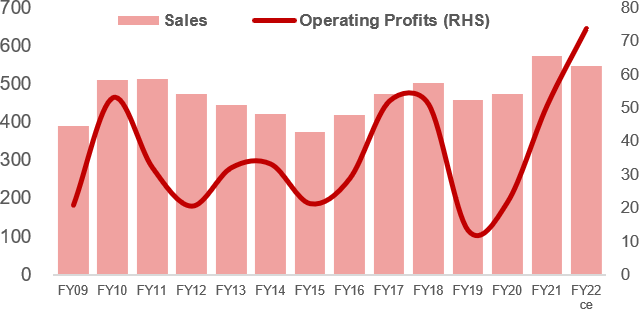
(Source) Prepared by Nomura Asset Management based on KOA Corporation materials
Mukaiyama I think the main point is that we have focused on electronic components and resistors for 80 years, rather than completed products. It is true that the sales of completed products are large, and it is attractive to deliver products directly to consumers. Nevertheless, by sticking to our direction as a dedicated parts manufacturer, we strengthened our relationship of trust with our set manufacturer customers. The purity of our business has been a success, allowing us to make proactive proposals.
There was also a turning point in our overseas business. We first expanded into the United States, but ultimately withdrew in about a year. Subsequently, the top of a US rival company offered us a partnership. It was a time of generational change in the global resistor industry and the rival company had been attracted by KOA's quality and founding philosophy. That was the origin of our U.S. operations.
Such was the case with our operations in Germany and Taiwan. Local companies were impressed by KOA's founding spirit and the relationships we had built, and we have been managing our regional entities beginning with this spirit of working together.
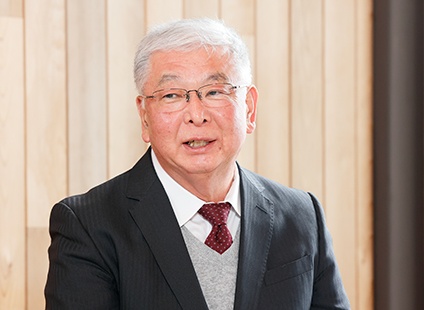
Hanagata Another major factor is that we have continued to try to maintain our core business. In response to the Plaza Accord in 1985, the U.S. dollar exchange rate dropped sharply. We used the opportunity to create a new management system to strengthen our core businesses so that we could be profitable only from orders received. It is now called the KOA Profit System (KPS), and it is an ongoing improvement activity in which all employees participate through means such as eliminating wasteful management. This activity is continuing today. The dedication of our long-term employees has become KOA's corporate culture, in which we take pride.
In the early 1990's, the shift from analog to digital drove sales for resistors electrical products. Around that time, we started doing business with Tier 1 car manufacturers. In Stage 2 of the KPS which began around 2000, we have been working to improve the quality of our products, aiming to become the company of choice for our customers.
Safety and Reliability are Strengths in the Shift to EV
Koike I believe that your market share in automotive resistors is expanding due to your advanced technology. The automotive segment accounts for more than 40% of your company's sales, and I believe that this is an area where further growth can be expected in line with the further electrification of automobiles. KOA's business could play a major role in this development. How do you view the situation?
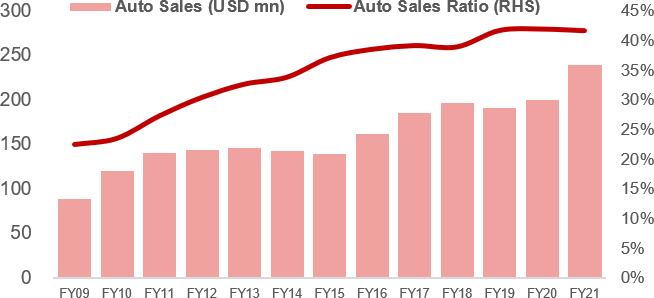
Mukaiyama Even from our point of view, the scenery is changing. The players have changed greatly, and cars are becoming more like consumer products. Some new entrants seem to think that it's an open field as long as you aren't using internal combustion engines, but I'm not sure it's that easy to start a job that's directly linked to human life.
The same applies to industrial equipment that supports social infrastructure. All of these areas are closely related to human life and social systems, and are both important and risky. For example, if something goes wrong with KOA products, we can theoretically identify the cause alongside data, understand the impact, and take immediate action. Some foreign manufacturers who prioritize cost and profit over quality will not be able to provide such services. We expect to see an era in which component manufacturers will be held accountable for their safety and security.
In the United States, it can't be helped that the pursuit of convenience, like the flying cars, will be treated as a consumer product. However, as long as it is mobility, there is no change in the point that it is directly linked to human life. Manufacturers who take this lightly will inevitably suffer severe consequences in the event of a major accident.
Looking at the world's longest-lived companies, it is remarkable that Japanese companies outnumber their peers by far. For example, more than 60% of companies that have been operating for more than 200 years are Japanese companies. I think that Japanese companies have literally put sustainability into practice and developed distinctive industries. In terms of sustainability, I think Japanese companies, including us, can take pride in being leaders.
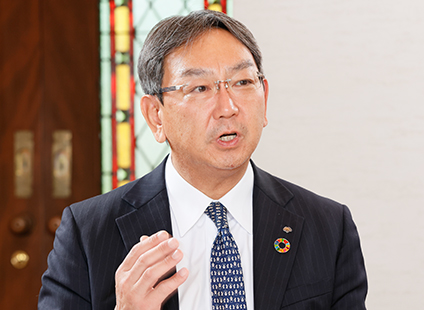
Koike KOA has included 44 billion yen of capital investment over three years in its most recent medium-term management plan. I understand that this 10 billion yen in annual capital investment is a first since the company's founding. I imagine it is linked to growth in the automobile market and demands from suppliers, however, it is a significant decision for a company. Could you share some of the background behind this large scale investment decision?
Hanagata It's certainly a significant investment, but it's also a sign that the needs are clear. I don't think it's a gamble, because the needs for 5 to 10 years ahead are clear in our earnest dialogue with clients.
In addition, as a resistor manufacturer, there are fewer competitors who can accurately respond to customer demands, and for the past 10 years we have increased R&D expenditures from 3% to 4% of net sales. It is not without risks, including the situation in Ukraine, but we believe that this investment is necessary to fulfill our supply and development responsibilities for our customers.
Koike Having seen your factory, I'm left with the impression that this is a necessary investment to meet your supply needs. Additionally, hearing about the future of EVs makes me feel this is a truly attractive business. I feel your stock merits higher valuation in the stock market, but how do you feel?
Mukaiyama Investors judge stock prices on profitability and potential, both of which are expressed in numerical terms. However, KOA's values are rooted in the local community of families, businesses, temples and shrines, and hospitals, and the "hometown happiness" that springs from the trust we build with our five core entities cannot be expressed in numerical values. As a listed company, it is natural to raise profits, but I am hopeful that KOA's core values will come to be appreciated in the stock market.
Koike It was a delight to once again here there are wonderful companies like yours that not only have growth potential but also have strong philosophy of contributing to the local community. Additionally, I believe this value can be linked to your corporate value through improved information disclosure and investor relations.
I believe that there are still many Japanese companies with unique strengths rooted in local communities. If KOA can serve as a benchmark or an example for these companies, I believe that Japan's local communities and economy will be revitalized.
We believe in promoting this type of movement, and we would like to help spread it to the world.
Hanagata While we have not been very pro-active in PR in the past, we will be releasing a consolidated report in 2023. Please look forward to it.
Mukaiyama Regardless of company size, there are many Japanese executives I deeply respect. I believe the time has come to pro-actively promote the merits of Japanese management, and I look forward to working more with you.
Koike Thank you for today's valuable discussion.
This report is not intended as a solicitation or recommendation with respect to the purchase or sale of any particular investment.
(Date of publication: February 24, 2023)
